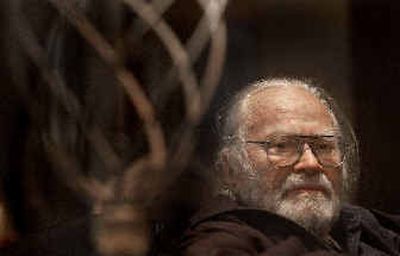Film shines new light on Rosenbergs

He stands all of 5-and-a-half-feet tall, he walks with a cane and he has trouble remembering names. But 87-year-old Morton Sobell still blazes with the inner fire of a born political activist.
What else would you expect of someone who was a principal part of the Rosenberg espionage trial, a case that more than a half century later still rouses strong emotions among those who lived through the Cold War?
“What other case in political history has lasted this long?” Sobell told a crowd at the AMC River Park Square Theaters Wednesday night. “People are still writing books about it.”
Sobell was in Spokane to appear at the screening of the documentary film “Heir to an Execution,” which was shown as part of the 2005 Spokane International Film festival.
“Heir to an Execution” was directed by Ivy Meeropol, granddaughter of Julius and Ethel Rosenberg. It documents Meeropol’s attempts to contact members of the Rosenberg family who had estranged themselves from the couple after the government accused them of being Soviet spies.
In 1951, Sobell was convicted – along with the Rosenbergs – of conspiracy to commit espionage. After serving nearly 19 years of his 30-year sentence, five years of which he spent at the infamous federal penitentiary on Alcatraz Island, Sobell was paroled in 1969.
The Rosenbergs were both sentenced to death. They were executed on June 19, 1953.
Sobell insists that the trial was a miscarriage of justice.
“I did nothing, nothing,” Sobell said during a post-screening question-and-answer session.
“The government approached me from the word go,” he said. “They let me know that if I didn’t help them they would send me to Alcatraz.”
But, he said, “It didn’t occur to me to provide them names. I wouldn’t know what names to give them. …”
Now living in Danbury, Conn., Sobell said in a recent phone interview that he spends most of his time working on a project that, he says, rebuts the government’s case against both him and the Rosenbergs.
One of his main targets: documents that have been presented as proof of the espionage charges.
“In 1995 the government came out with what they said were decryptions of Soviet cables,” Sobell said. “The whole thing was called ‘Venona,’ and these ‘proved’ that Julius was guilty.”
While Sobell doesn’t dispute the existence of the “Venona” cables themselves, he does question that they identify Julius Rosenberg. He maintains that it was only after the arrest of David Greenglass, Ethel Rosenberg’s brother and one of the government’s main witnesses against the couple, that Julius became a target.
“Initially, they identified somebody else,” Sobell said.
As for himself, Sobell maintains that he was never “an atom spy” and should never have been tried with the Rosenbergs.
“The government dragged me in because Ethel and Julius together would not have made a conspiracy,” he said. “So, right from the beginning you start out with the slimy stuff.”
He’s amazed how little people today know about the case.
“If you read the history books, half of them say we were convicted of treason,” he said Wednesday. “But that was wrong. We were all convicted of one charge: conspiracy to commit espionage.”
His hope is that, when all the facts come out, history will be the judge.
“I have a copy of the trial record, and I’m trying to get some law professors and students to do a commentary on it, the appeals and what-not,” Sobell said. “So then we’ll put that on a CD or DVD and try to circularize it. It’s a minimum-amount-of-money thing, but I just want to get it out.”
As for Meeropol’s movie, Sobell says that, had it been his project, he would have emphasized politics.
“On the other hand, if I shot a film that was more political, it wouldn’t be shown here,” he said. “It wouldn’t be acceptable. So I really think that the film is the best possible film that could have been done under the circumstances and still be out there so that people could enjoy it.”
Following Wednesday night’s question-and-answer session, Sobell showed just how much fight he had left when an audience member approached him and said that it was a miracle he had survived in prison.
“No, no,” Sobell said. “I didn’t survive. I thrived.”